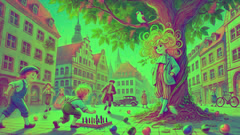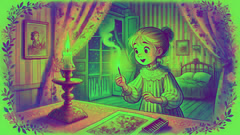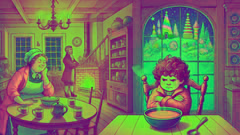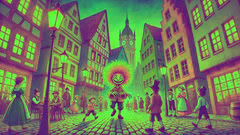Introduction
In the heart of 19th-century Frankfurt, where gas lamps flickered at dusk and the cobbled streets rang with the laughter of children, there lived a boy so peculiar that his very name became a legend whispered in every nursery: Struwwelpeter. He was not an evil child, nor was he cruel, but his appearance startled passersby and inspired awe among his peers. Struwwelpeter—Shock-headed Peter—was known for the wildest mop of hair anyone in the city had ever seen, a bramble of golden tangles bursting in every direction, and fingernails so long and jagged they seemed like claws. His mother, with gentle patience and a mother’s loving sighs, begged him to let her trim his nails and brush his hair, but Peter refused, delighting in his defiance and the way sparrows sometimes tried to nest in his unruly locks.
Yet Peter was not alone in his mischief. The city teemed with children, each with quirks and misbehaviors of their own. There was Pauline, who played with matches, drawn by their mysterious fire. There was Augustus, a boy so stubborn he refused to taste even the sweetest soup, and Harriet, whose thumb-sucking habit brought her all sorts of trouble. In the alleys and squares of old Frankfurt, their stories intertwined—a tapestry of lessons, laughter, and sometimes, tears. For every misdeed or stubborn habit, there seemed to be a consequence—sometimes comic, sometimes harsh, but always instructive.
The tales of Struwwelpeter and his friends soon found their way into illustrated books, passed from hand to hand by worried parents and curious children. These were not stories of monsters or witches, but of everyday temptations and choices. Their lessons were clear: kindness matters, mischief carries a price, and small acts—like washing one’s hands or showing respect—could change a day or even a life. Yet, as these stories were retold, they grew richer and more imaginative. Children saw themselves in the colorful pages, sometimes laughing, sometimes shivering, but always learning.
This collection is a fresh retelling of those timeless tales, painted anew with detail and warmth. Each story explores the adventures of Peter and his friends, their mistakes and moments of wisdom, and the gentle guidance of those who love them. Step into a world where the ordinary becomes extraordinary, and the lessons learned stay with you long after the final page.
Chapter 1: The Boy Who Would Not Be Tamed
Struwwelpeter awoke with the sunlight streaming through his bedroom window, casting bright patches across the tangled thicket of his hair. The world outside was already alive with the distant clatter of horse-drawn carts, the bark of dogs, and the sing-song voices of street vendors hawking their wares. Yet within the little townhouse on the edge of the Römerberg, all was quiet but for the persistent murmur of Peter’s mother, who hovered with a brush in one hand and a pair of silver nail scissors in the other.

“Peter, please, let me tidy you up,” she pleaded, as she had so many times before. But Peter shook his head, delighting in the way his locks bounced and his nails clacked against the wooden banister. His father, a kindly but exasperated man, peered over his spectacles and sighed. “One day, Peter, you’ll see the trouble your stubbornness brings.”
Peter didn’t care. He dashed out the door and into the bright morning, hair catching the wind like a lion’s mane. In the square, children gathered to play marbles and leapfrog, but most kept their distance from Struwwelpeter, a little wary of his strange appearance. Only Emil, a cheerful boy with a gap-toothed grin, dared to approach. “Come play tag, Peter!” he called. But as they dashed through the square, Peter’s nails snagged the edge of a merchant’s table, sending apples tumbling. The shopkeeper scolded, and Peter’s cheeks burned with shame, though he tried to laugh it off.
He wandered on, soon forgetting the mishap as he discovered a nest of sparrows in the old sycamore tree. One bold fledgling fluttered onto his shoulder, pecking curiously at his tangled hair. Peter giggled, delighted to befriend the little bird. It wasn’t long, however, before trouble found him again. His nails, so sharp and long, scratched the bark as he tried to climb for a better view. The branch snapped, and Peter tumbled down, escaping with only a bruised elbow—but the bird’s nest was ruined. He felt a pang of guilt watching the mother sparrow chirp in distress.
Back at home, his mother knelt beside him, dabbing his wound. “If only you’d let me trim those nails,” she said gently. Peter looked away. At dinner that night, his father said, “Every choice has its consequence, Peter. Sometimes we learn by doing, sometimes by listening.” Peter poked at his stew, silent but thoughtful for once.
The next morning, he sat quietly as his mother brushed his hair—just a little—and clipped one ragged nail. It was a small step, but the beginning of change. Peter learned that stubbornness can bring more trouble than joy, and that there’s kindness in letting others care for you.
From that day, the children in the square grew less wary. Peter’s hair was still wild, but his nails were neat, and he found more friends willing to play. The sparrows returned to their tree, and Peter never again disturbed their nest. He became not just the strangest boy in Frankfurt, but also one of the kindest, remembered for his laughter and his lessons learned.
Chapter 2: Pauline and the Tempting Flames
Pauline was a curious child, always eager to explore the world’s secrets. Her favorite discoveries came in the form of forbidden treasures: her father’s pocket watch, her mother’s perfume bottles, and most of all, the mysterious box of matches kept high on the kitchen shelf. Her parents warned her daily about the danger of fire—tales of burnt fingers and ruined homes. Still, Pauline’s fascination only grew.

One chilly afternoon, when rain tapped against the windowpanes and her mother was busy kneading dough in the kitchen, Pauline spied her chance. Quietly, she pulled a chair to the shelf and reached for the box of matches. They felt heavy in her hand, a promise of magic. She slipped away to her bedroom and closed the door, heart pounding with anticipation.
With trembling fingers, she struck a match. The flame danced, small and bright, casting flickering shadows across her dolls and books. For a moment, she was entranced. But the match burned low, singeing her finger. Pauline yelped, dropping it. The flame caught on the hem of her curtain. Panic surged through her as she tried to pat it out, but the fire leapt hungrily, devouring the fabric. Pauline screamed for help.
Her mother rushed in, dousing the flames with a heavy blanket, coughing as smoke filled the room. Pauline sobbed in her arms, her finger stinging, her pride wounded. The fire left a black scar on the wall—a reminder of curiosity turned careless. That night, as the rain continued to fall outside, Pauline’s parents sat with her by the hearth. Her mother’s voice was gentle but firm: “Curiosity is good, Pauline, but wisdom keeps us safe. Some things aren’t meant for children’s hands.”
Pauline nodded, tears drying on her cheeks. She promised never to touch the matches again, and this time she meant it. As she grew, her curiosity turned to safer things: learning to bake bread with her mother, painting bright scenes of flowers and meadows, and reading stories by the fire. She became wise in her wonderings, never forgetting the lesson of the tempting flames.
Chapter 3: Augustus and the Soup of Stubbornness
Augustus was known far and wide for his stubborn streak. He had a round face, a mop of brown curls, and a perpetual frown when it came to food. No matter how lovingly his mother prepared stews, soups, and dumplings, Augustus crossed his arms and declared, “I won’t eat it!” His parents tried every trick: sweet words, stories at the table, even sneaking treats into his soup. Nothing worked.

As the autumn days grew shorter and colder, Augustus grew thinner. His cheeks lost their rosy glow, and he no longer raced through the streets with the other children. Instead, he sat by the window, listless and pale. His mother wept in worry; his father paced the kitchen floor. “What will become of our boy?” they fretted.
One evening, as a sharp wind rattled the shutters, Augustus’s mother set a steaming bowl of chicken soup before him. “Please, Augustus,” she begged. “Just one spoonful.” But Augustus shoved the bowl away, spilling broth across the table. He stomped to his room, hunger gnawing at his belly but pride holding him fast.
That night, Augustus dreamed of a land made of sweets—mountains of marzipan, rivers of cocoa, trees hung with sugarplums. But as he reached for a candy apple, it vanished in a puff of smoke. In its place stood a wise old woman wrapped in a patchwork shawl. “You cannot live on stubbornness alone,” she said kindly. “Your body needs care, just as your heart does.”
Augustus woke, heart pounding, and tiptoed to the kitchen. His mother, still awake, sat at the table with her head in her hands. Augustus crept close and whispered, “I’m hungry.” She smiled through her tears, ladling a warm spoonful of soup into his bowl.
From that night on, Augustus’s stubbornness softened. He learned to taste before he refused, to trust the care in his mother’s cooking. The color returned to his cheeks, and laughter filled their home once more. He discovered that pride could be as bitter as hunger and that sometimes the wisest choice was the simplest: to accept what is given with an open heart.
Conclusion
Through the winding streets and candlelit homes of Frankfurt, the stories of Struwwelpeter and his friends echoed with laughter and warning. Each child learned that their quirks and missteps—be it wild hair, curiosity for fire, or stubbornness at the table—brought consequences but also growth. Struwwelpeter found friendship and self-acceptance as he learned to let others care for him; Pauline discovered wisdom through a close brush with disaster; Augustus realized that pride could be set aside for love and nourishment. Their adventures wove together into a tapestry of cautionary tales, rich with color and life, inviting children everywhere to reflect on their choices and find courage in small acts of wisdom. In these timeless tales, every lesson learned was a step toward a kinder heart and a brighter future.













